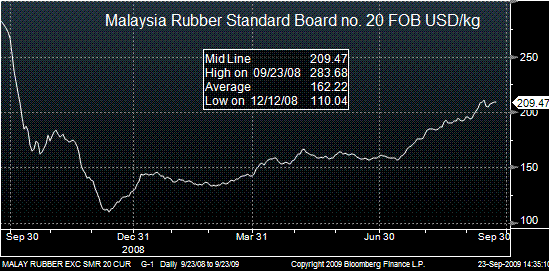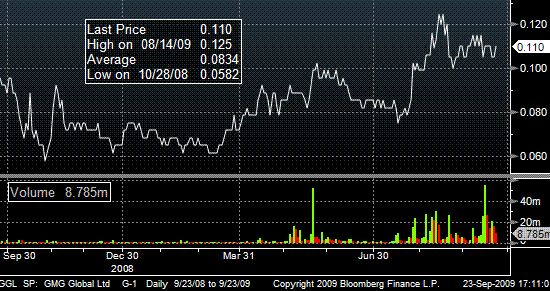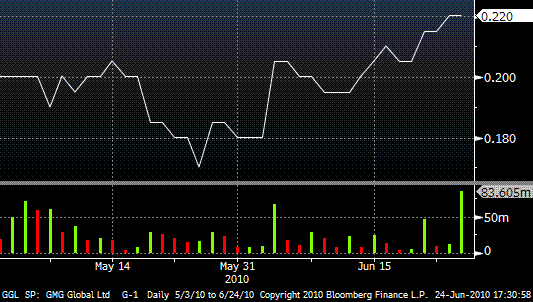
RUBBER PRICES are on a steady recovery.
After a sudden collapse during 4Q08, rubber prices have nearly doubled year-to-date to more than US$200 per kg again.
Natural rubber inventory fell during 1Q09, when global natural rubber consumption exceeded production by 280,000 tons (15%), after 6 months of inventory accumulation.
GMG GLOBAL |
|
| Recent stock price | 10.5 cents |
| Market cap |
S$403.1m |
| 52-week High/ Low | 13 / 5.8 cents |
| Historical PE | 11.0 X |
| Dividend yield | 3.3% |
| Price/Book | 1.1 X |
And this is good news for GMG - as rising rubber prices directly have a bearing on the company's bottomline.
Europe and the Americas had formerly accounted for the lion’s share of sales (86% in FY08), but the SGX-listed rubber player now wants to play its China cards.
A year ago, Sinochem, China’s No.1 natural rubber trader and its tenth largest company based on 2008 revenues, acquired 51% in GMG through a voluntary cash offer.
Most of the rubber produced worldwide is for manufacturing tires, and the recovery is being driven by automobile sales in China, where 8.3 million vehicles were sold during the first 8 months of this year, up 28% year-on-year.
The company recently raised about S$100 million in a 9-for-10 rights issue at 5.5 cents per share, or a discount of 56% to the stock price when the offer was announced.
About half of the rights shares went to Sinochem, with its 51% stake.
GMG increased its cash reserves to S$168.2 million after the rights issue, and remains in a net cash position.

Immediately after the rights shares were listed on 15 Sep 2009, the rubber producer signed an MOU to buy 75% of an Indonesian factory that processess natural rubber.
GMG and the existing shareholders will respectively put up US$3.5 million in equity and US$4 million in shareholders’ loan for the JV according to their 75:25 stake.
Known as PT Harapan Sentosa, the factory is located in Pontianak, West Kalimantan and has an annual production capacity of 25,000 metric tons.
All natural rubber produced by the JV will be distributed by GMG’s subsidiary.
In addition, GMG also has majority stakes in 2 plantations and processing facilities in Central Africa with gross processing capacities of 86,000 (metric) tones a year, as well as a 51% stake in another factory in Kalimantan with processing capacity of 30,000 tons a year.
The stock closed at 10.5 cents per share on Thu.
GMG has said that its performance is highly dependent on factors such as:
a) the global economic stability, market prices of natural rubber and production volumes which could have an impact on sales;
b) the yields from the plantations;
c) weather conditions that could impact on production both from internal and external supply sources;
d) fluctuations of the Euro currency, United States currency and Indonesian Rupiah which will have a direct impact on the Group’s operating costs and profitability;

Related story: GMG: Working on a 3-year China strategy



